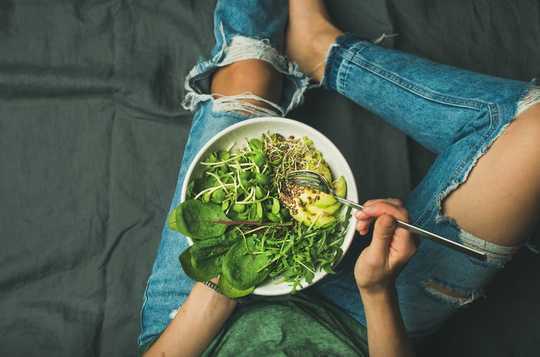 Shutterstock
Shutterstock
The coronavirus presents many uncertainties, and none of us can completely eliminate our risk of getting COVID-19. But one thing we can do is eat as healthily as possible.
If we do catch COVID-19, our immune system is responsible for fighting it. Research shows improving nutrition helps support optimal immune function.
Micronutrients essential to fight infection include vitamins A, B, C, D, and E, and the minerals iron, selenium, and zinc.
Here’s what we know about how these nutrients support our immune system and the foods we can eat to get them.
Get The Latest By Email
1. Vitamin A
Vitamin A maintains the structure of the cells in the skin, respiratory tract and gut. This forms a barrier and is your body’s first line of defence. If fighting infection was like a football game, vitamin A would be your forward line.
We also need vitamin A to help make antibodies which neutralise the pathogens that cause infection. This is like assigning more of your team to target an opposition player who has the ball, to prevent them scoring.
Vitamin A is found in oily fish, egg yolks, cheese, tofu, nuts, seeds, whole grains and legumes.
Further, vegetables contain beta-carotene, which your body can convert into vitamin A. Beta-carotene is found in leafy green vegetables and yellow and orange vegetables like pumpkin and carrots.
2. B vitamins
B vitamins, particularly B6, B9 and B12, contribute to your body’s first response once it has recognised a pathogen.
They do this by influencing the production and activity of “natural killer” cells. Natural killer cells work by causing infected cells to “implode”, a process called apoptosis.
At a football match, this role would be like security guards intercepting wayward spectators trying to run onto the field and disrupt play.
 Fish is a good source of vitamin B6. Shutterstock
Fish is a good source of vitamin B6. Shutterstock
B6 is found in cereals, legumes, green leafy vegetables, fruit, nuts, fish, chicken and meat.
B9 (folate) is abundant in green leafy vegetables, legumes, nuts and seeds and is added to commercial bread-making flour.
B12 (cyanocobalamin) is found in animal products, including eggs, meat and dairy, and also in fortified soy milk (check the nutrition information panel).
3. Vitamins C and E
When your body is fighting an infection, it experiences what’s called oxidative stress. Oxidative stress leads to the production of free radicals which can pierce cell walls, causing the contents to leak into tissues and exacerbating inflammation.
Vitamin C and vitamin E help protect cells from oxidative stress.
Vitamin C also helps clean up this cellular mess by producing specialised cells to mount an immune response, including neutrophils, lymphocytes and phagocytes.
So the role of vitamin C here is a bit like cleaning up the football ground after the game.
Good sources of vitamin C include oranges, lemons, limes, berries, kiwifruit, broccoli, tomatoes and capsicum.
Vitamin E is found in nuts, green leafy vegetables and vegetables oils.
4. Vitamin D
Some immune cells need vitamin D to help destroy pathogens that cause infection.
Although sun exposure allows the body to produce vitamin D, food sources including eggs, fish and some milks and margarine brands may be fortified with Vitamin D (meaning extra has been added).
Most people need just a few minutes outdoors most days.
People with vitamin D deficiency may need supplements. A review of 25 studies found vitamin D supplements can help protect against acute respiratory infections, particularly among people who are deficient.
5. Iron, zinc, selenium
We need iron, zinc and selenium for immune cell growth, among other functions.
Iron helps kill pathogens by increasing the number of free radicals that can destroy them. It also regulates enzyme reactions essential for immune cells to recognise and target pathogens.
 Whole grain foods contain a variety of important nutrients. Shutterstock
Whole grain foods contain a variety of important nutrients. Shutterstock
Zinc helps maintain the integrity of the skin and mucous membranes. Zinc and selenium also act as an antioxidant, helping mop up some of the damage caused by oxidative stress.
Iron is found in meat, chicken and fish. Vegetarian sources include legumes, whole grains and iron-fortified breakfast cereals.
Zinc is found in oysters and other seafood, meat, chicken, dried beans and nuts.
Nuts (especially Brazil nuts), meat, cereals and mushrooms are good food sources of selenium.
Putting it all together
It’s true some supermarkets are out of certain products at the moment. But as much as possible, focus on eating a variety of foods within each of the basic food groups to boost your intake of vitamins and minerals.
While vitamin and mineral supplements are not recommended for the general population, there are some exceptions.
Pregnant women, some people with chronic health conditions, and people with conditions that mean they can’t eat properly or are on very restrictive diets, may need specific supplements. Talk to your doctor, Accredited Practising Dietitian or pharmacist.
And beyond diet, there are other measures you can take to stay as healthy as possible in the face of coronavirus.
Stop smoking to improve your lung’s ability to fight infection, perform moderate intensity exercise like brisk walking, get enough sleep, practise social distancing and wash your hands with soap regularly.![]()
About The Author
Clare Collins, Professor in Nutrition and Dietetics, University of Newcastle
This article is republished from The Conversation under a Creative Commons license. Read the original article.
books_food










